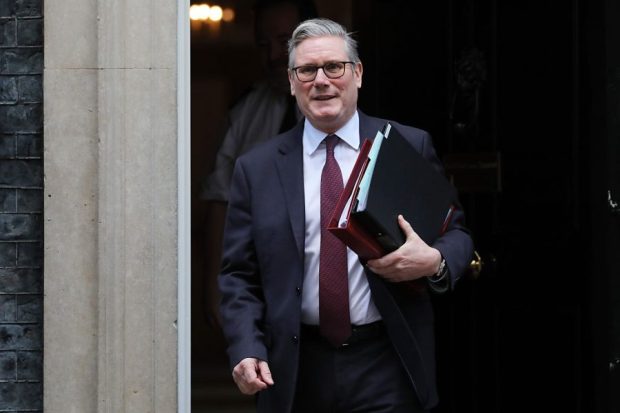The boomers are eating their grandchildren. They don’t see it this way, of course, but they are doing it nonetheless. Covid, or rather the British state’s response to the pandemic, is just the latest evidence of this.
Whatever you make of Boris Johnson’s handling of the pandemic, one thing is clear: the cost of lockdown will be funded by young people in taxes for years to come. But it will most of all be paid for with time. We can find ways to minimise the impact of the government debt, but we can’t give people a year of their lives back.
It is a natural part of history that good fortune is not distributed evenly. That some generations are lucky and others are not is obvious, as is the fact that some will be called upon to make greater sacrifices. The greatest generation – now mostly passed – fought for the freedom and security that we take for granted; sitting at home for a year with Netflix and Amazon is a trifling price in comparison. It is unfortunate however that the burden of combating the pandemic is falling upon Millennials and Generation Z, while the benefits accrue to generations that have given less and taken substantially more.
The usual litany of messes left for the future aside – antibiotic resistance, endocrine-disruptors in the water supply, a planet slowly cooking itself in their emissions – our elders have voted themselves ever higher benefits without taking the step of paying for them.
Those costs are left to the next generation. When asked about the state pension, the common response from recipients is that they paid in for it. This is untrue: they paid for the previous generation’s retirement, and we will pay for theirs. This is why it’s possible to vote for a triple lock; there is no hard tie to what they contributed either individually or in aggregate.
That the state pension resembles a ponzi scheme structured on an assumption of an ever-growing population is not entirely the fault of today’s pensioners. But it does present an ever larger drain on the finances of Britain’s young thanks to a combination of generous growth in entitlements and the size of the Boomer cohort.
From one perspective, the last decade looks like a war on the future of this country. The mulish insistence on maintaining the triple lock alongside the howls of outrage at the suggestion that the elderly can just about afford to pay for their TV licences sits poorly alongside the harsh rhetoric deployed when payments for younger people were slashed.
Covid has merely exacerbated existing trends. People now in their 30s are the first generation to earn less than those born ten years before them since the 1930s. Record numbers of young people live with their parents, trapped by a dysfunctional housing market and unstable employment. Millennials spend a far higher proportion of their income on housing costs than the Boomers did at their age, with spiralling rental costs largely to blame. The typical family headed by a thirty year old today would take 19 years to save a deposit for a home. In the 1980s, it would have taken three years.
Bearing the brunt of Covid job losses – more than half the drop in employment has occurred among the under-25s – is just another item on the list. That the people who have sacrificed so much will be the last ones to get their Covid vaccines is merely adding insult to injury.
The real cost, however, is borne by the future generations. When I say the Boomers are eating their grandchildren, I mean it. It’s not just that they’re crushing the life chances of the under 40s, it’s that the price of this current situation means far fewer children are being born.
Fertility in the West is plummeting, and not simply because people are ‘in control’ of family sizes. Fertility intentions – the number of children women want and intend to have – were safely at replacement level in Europe, and well above them in America, where young women want 2.7 children, but will probably have 1.8.
It doesn’t take much digging to draw some brief conclusions about why this might be. The reasons Americans give sound very familiar to British ears; 64 per cent say childcare is too expensive, 44 per cent can’t afford more children, 43 per cent waited because of financial instability, 36 per cent struggled with their work-life balance.
In the UK, in particular, we know that a rise in house prices leads to a temporary increase in the number of children home-owners have but reduces fertility for renters. This makes perfect sense; the first group are seeing a rise in net wealth, and the second a rise in living costs. This is a problem because millennials – the generation that should be starting families and raising children – are half as likely to own a home by 30 as the baby boomers were, and four times as likely to rent privately. A full quarter of their net income goes on housing costs.
That British housing is vastly expensive is sometimes viewed as a natural consequence of living in a wealthy country. That this is untrue simply requires the briefest of looks around the world. Prices are, as ever, a function of supply and demand. And that supply in Britain is choked out by regulation, alongside an unwillingness on the part of politicians to face down an elderly population that holds existing housing wealth and objects vociferously to new builds and extensions.
The Covid response and the unintended side effects – imposing a lockdown which makes it all but impossible for young people to meet new partners, destroying employment and the accumulation of savings, and piling on new government debt to preserve the generation funded by their taxes – is once again exacerbating existing trends.
Despite the inordinate amounts of time and effort spent on drawing up ever more byzantine regulations – did you remember to order a scotch egg with your pint? – there has been almost no consideration of non-cohabiting partners throughout the past year, other than Matt Hancock advising young couples unsure whether they wanted to spend months apart or move in together to ‘make your choice and stick with it’.
When this all finally ends, it is very likely that the government will revert to business as usual. We should not let them forget quite how much we are owed for this lost year: there needs to be a significant settlement in favour of the young.
A good place to start would be ensuring that young people can actually afford decent housing. Radically improving planning to bolster the quality and quantity of the UK’s housing would be a sensible move, particularly if you want there to be a next generation of British people to pay for the Covid spending. Throttling family formation through gearing a property market towards generating returns for incumbents is bad policy at the best of times. It is downright mad in the current circumstances.
A Policy Exchange paper on street votes – allowing residents to control the development of their own street by increasing density and height – suggests small, pragmatic changes that could bring life-changing benefits for existing residents and create 110,000 additional homes every year for the next 15 years without touching the greenbelt or imposing high-rise towers. With those homes focused in areas of high demand, they would do a significant amount to ease the housing crisis for young people.
This has the benefit of being one of the proposals where improving life for young people and addressing a genuine crisis is not a zero-sum game. Existing property owners win when they expand their homes or sell with the right to do so at a considerable profit; incoming owners benefit from the greatly increased housing stock. There is enough benefit for everyone to come out ahead as inefficiencies in the planning system are removed.
Other policies worth examining include greater support for young people attempting to start families. Stronger entitlements to maternity or paternity leave, subsidised childcare, cash payments on birth, larger tax credits for dependent children are all options, and better uses of government funds than constantly uprating already generous pensions.
Mitt Romney’s plan to provide large and simplified payments to parents in America should be an indicator of the ambitious scale that is feasible. The Covid response should, if nothing else, have shifted the fiscal Overton window on this topic. We’ve spent £280 billion this year on the pandemic. Quibbling about the cost when it comes to ensuring our society reproduces itself would show deeply warped priorities.
The cost of the last year to the young can be viewed as a year of lost freedom. Reducing that lifetime ‘freedom deficit’ by increasing their ability to live well and live the sort of lives their parents and grandparents were able to seems like a reasonable gesture in return.
Oh. And scrap the triple lock.<//>




















